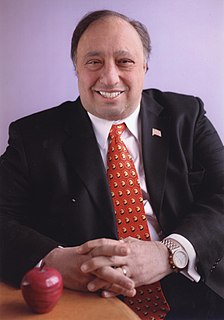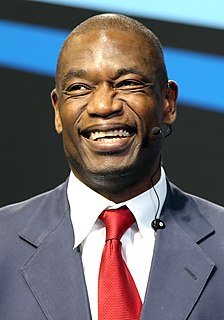A Quote by John Catsimatidis
When the commodities go up and the cost of transportation is going up, and the value of the dollar is going down, it's all going to translate to an 8 to 10 percent rise in food prices.
Related Quotes
Yet if you go to the supermarket and look at food that's produced through industrial agriculture, look at what's happened to the prices. Have they been going down? They've been going up and they will continue to go up. So the choice is either, do we hitch onto a system of agriculture that's doomed and will doom the planet with it, and go along the route of industrial agriculture, or do we want to shift to a kind of system that we know is going to be, in the long run, cheaper, because we'll have a planet left at the end of it? We need to factor that cost in.
Gold has intrinsic value. The problem with the dollar is it has no intrinsic value. And if the Federal Reserve is going to spend trillions of them to buy up all these bad mortgages and all other kinds of bad debt, the dollar is going to lose all of its value. Gold will store its value, and you'll always be able to buy more food with your gold.
If you really think that houses prices are going to go up next year and the year after, you feel if I don't buy it this year, I'm going to have to buy it next year. [...] And when somebody makes it very easy for you to do it by saying you don't really have to put up my money, you can lie about your income a little, or we'll give you 100 percent mortgage, you're going to do it, because everybody that's done it has been proven right. You have what they call social tools, and, you know, you're going to feel like an idiot if you didn't do it, because the house cost more.
We're going to build a wall and Mexico is going to pay. And the reason they're going to pay and the way they're going to pay, Bob, is this. We have a trade deficit now with Mexico of $58 billion a year. The wall is going to cost $10 billion a year. That's what it's going to cost. It's going to be a powerful wall. It's going to cost $10 billion.
Most paper money initially existed as a substitute for gold. That's what gave it value. But right now what gives a currency value is other currency. Most countries hold reserves and the reserves are other currencies. If you are a backing up the euro with the dollar, what's backing up the dollar? I don't think it is going to go to a point where all you have is coins and bars of gold, but I do think that we are going to have to go back to a monetary system based in gold, not based on paper.
We broke up, and my first reaction was 'Fine - I've been through this too many times. I can't change your mind. I can't live your life for you. You're gone in your direction. I'm going to pick up; I'm going to go in my direction. I'm not going to live in the past. I'm not going to embrace the pain. You go, I'll go, and that will be it.' And I felt that way for an hour and 10 minutes.
When we look at transportation in America, there's going to be companies like Magic Bus, where you have these private bus fleets. You're going to have carpooling; you're going to have these different types of transportation. It's going to be a full ecosystem, but it's not going to be a winner-takes-all.
Education is the lifeline of the city of Boston in a lot of ways, as far as preparing and educating young people for the future. So when we think about that - I would love to have the $25 million dollar investment we made up to close the gap on charter schools. I'd love to make that investment in a different part of the school system if we could. The money that we're trying to adjust on transportation, I would love to, if we can save money in transportation - that's not going to be a savings, that's going to come into the general fund, that's going to be reinvested in the school.
































